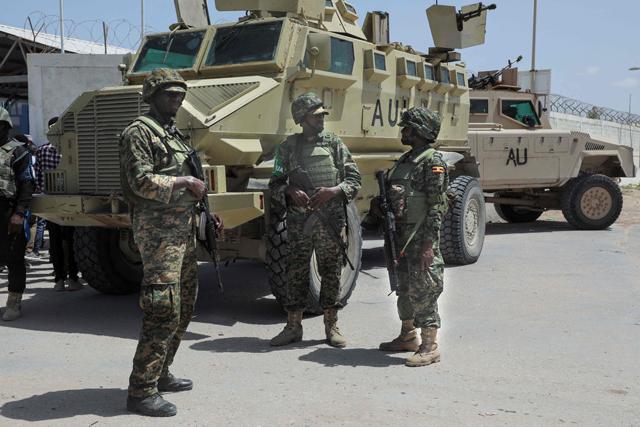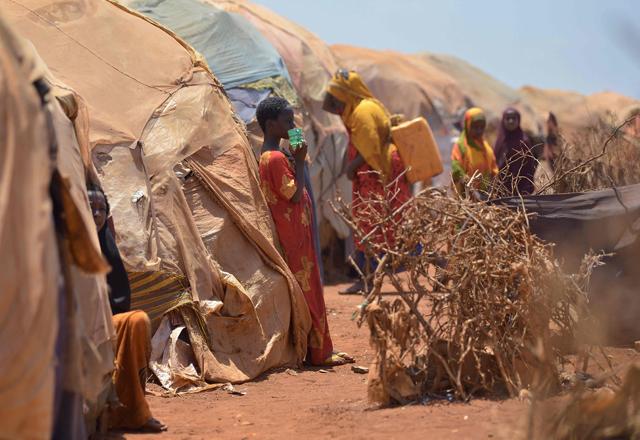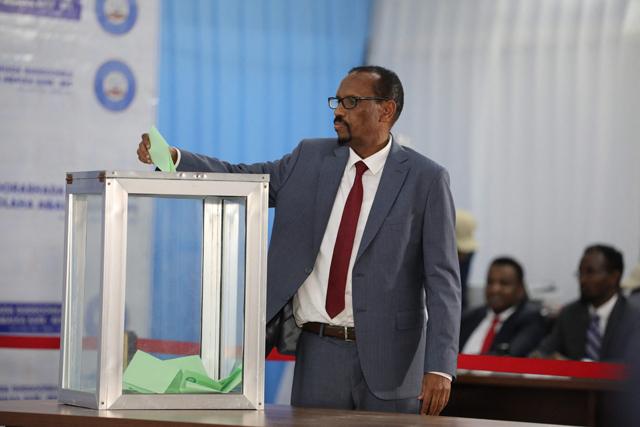You are here
Somalia MPs begin voting in long-delayed presidential election
By AFP - May 15,2022 - Last updated at May 15,2022

African Union soldiers man a security cordon during a complete lockdown of the entire city due to the presidential election in Mogadishu on Sunday (AFP photo)
MOGADISHU — Somali lawmakers began voting in the country’s long-overdue presidential election on Sunday, with dozens of candidates vying for the top job in the troubled Horn of Africa nation as it battles an Islamist insurgency and the threat of famine.
The poll has been dogged by claims of irregularities and is well over a year behind schedule, with Somalia’s international partners warning that the delays — caused by political infighting — were a dangerous distraction from the fight against Al Shabaab extremists.
MPs voted under tight security in a tent inside Mogadishu’s heavily-guarded airport complex, with little movement seen in the capital where police have imposed a curfew until Monday. Flights have also been cancelled, an official told AFP on condition of anonymity.
The vote is expected to draw a line under a political crisis that has lasted well over a year, after President Mohamed Abdullahi Mohamed’s term ended in February 2021 without an election.
“We are tired of living with uncertainty... I hope a president will be elected and today is the end of the nonsense,” Muktar Ali, a Mogadishu resident, told AFP.
Mohamed, better known as Farmajo, is now seeking reelection but faces tough competition from former presidents Sharif Sheikh Ahmed and Hassan Sheikh Mohamud.
Ex-prime minister Hassan Ali Khaire, Puntland state president Said Abdullahi Dani and former foreign minister Fawzia Yusuf Adan — the lone female contender — are also in the running.
In addition to a months-long feud between Farmajo and Prime Minister Mohamed Hussein Roble, the central government has also been embroiled in disputes with certain states, slowing down the voting process.
Somalia’s international partners, which include the United States, the United Nations and the African Union (AU), on Saturday urged parliamentarians to “vote their conscience”.
“High time for Somalia’s leadership to focus on reconciliation and peacebuilding,” the European Union’s foreign policy chief Josep Borrell said on Twitter.
An AU force is securing the election venue, after a spate of attacks in recent weeks by Al Shabaab which has been fighting to overthrow the government for more than a decade.
Complex process
The election is expected to take several hours and stretch late into the night with multiple rounds of voting.
“Three candidates have so far dropped out, and we [now] have 36 candidates running,” Senator Abdiqani Gelle, chairman of a parliamentary committee overseeing the election, said on Sunday.
A parliamentary source had earlier told AFP that four contenders had quit the race.
The victor must secure a minimum of 184 votes.
Somalia has not held a one-person, one-vote election in 50 years. Instead, polls follow a complex indirect model, whereby state legislatures and clan delegates pick lawmakers for the national parliament, who in turn choose the president.
“In terms of predicting the outcome, Somalia politics is notoriously difficult to predict, especially because it is an indirect, sort of closed system with MPs voting for the president,” said Omar Mahmood, an analyst at the International Crisis Group think tank.
“At the end of the day, I think it’s... predominantly about alliances and relationships rather than concrete ideas,” he told AFP.
Famine fears
The contenders have vowed to tackle Somalia’s myriad problems and bring relief to citizens weary of jihadist violence, surging inflation and a worsening drought that threatens to drive millions into famine.
UN agencies have warned of a humanitarian catastrophe unless early action is taken, with emergency workers fearing a repeat of the devastating 2011 famine, which killed 260,000 people — half of them children under the age of six.
The heavily indebted country is also at risk of losing access to a three-year $400 million (380 million-euro) aid package from the International Monetary Fund (IMF), which is set to automatically expire by mid-May if a new administration is not in place by then.
The government has asked for a three-month extension until August 17, according to the IMF, which has not yet responded to the request.
The international community has long warned Somalia’s government that the country’s political chaos has allowed Al Shabaab to exploit the situation and carry out more frequent and large-scale attacks.
Al Qaeda-linked extremists controlled Mogadishu until 2011 when they were pushed out by an African Union force, but still hold territory in the countryside.
Related Articles
MOGADISHU — Police in Somalia on Saturday announced a curfew in the capital Mogadishu, citing security concerns as they barred all public ac
MOGADISHU — Somalia's parliament elected a veteran politician as speaker of the lower house on Thursday, as the fragile nation edges closer
MOGADISHU — Somalia’s President Mohamed Abdullahi Mohamed has appointed a new prime minister hours after brokering an agreement with regiona


















